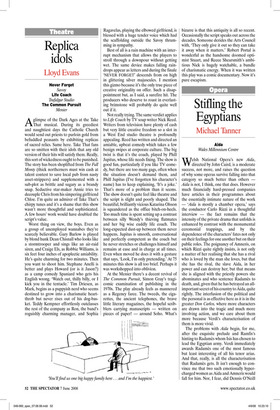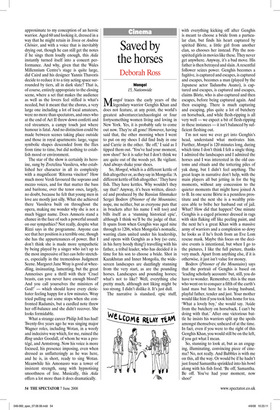Stifling the Egyptians
Michael Tanner
Aida
Wales Millennium Centre Welsh National Opera’s new Aida, directed by John Caird, is a moderate success, not more, and raises the question of why some operas survive falling into that category so much better than others — Aida is not, I think, one that does. However much financially hard-pressed companies have articles in their programmes about the essentially intimate nature of the work — ‘Aida is mostly a chamber opera,’ says the conductor Carlo Rizzi in a thoughtful interview — the fact remains that the intensity of the private drama that unfolds is enhanced by contrast with the monumental ceremonial trappings, and by the dependence of the characters’ fates not only on their feelings for one another but on their public roles. The poignancy of Amneris, on which Rizzi quite rightly insists, is not only a matter of her realising that she has a rival who is loved by the man she loves, but that she has the rival, the slave Aida, in her power and can destroy her; but that means she is aligned with the priestly powers she abominates and who sentence Radamès to death, and, given that he has betrayed an allimportant secret of his country to Aida, quite rightly. The interfusion of the political and the personal is as effective here as it is in the greater Don Carlos, where more characters are drawn into the tragic and much more involving action, and we care about them more because Verdi’s characterisation of them is more vivid.
The problems with Aida begin, for me, after the exquisite prelude and Ramfis’s hinting to Radamès whom Isis has chosen to lead the Egyptian army. Verdi immediately awards Radamès one of the most famous but least interesting of all his tenor arias. And that, really, is all the characterisation that Radamès gets. It isn’t enough to convince me that two such emotionally hypercharged women as Aida and Amneris would fall for him. Nor, I fear, did Dennis O’Neill approximate to my conception of an heroic warrior. Aged 60 and looking it, dressed in a way that he might retain in Tosca or Andrea Chénier, and with a voice that is inevitably drying out, though he can still get the notes if he sings them loudly enough, this Aida instantly turned itself into a concert performance. And why, given that the Wales Millennium Centre’s stage is quite large, did Caird and his designer Yannis Thavoris decide to reduce it to a tiny acting space surrounded by tiers, all in dark slate? That is, of course, entirely appropriate to the closing scene, where a set that makes the audience as well as the lovers feel stifled is what’s needed, but it meant that the chorus, a very large one including a lot of local amateurs, were no more than spectators, and ones who at the end of Act II threw down confetti and red streamers, a campy touch just where humour is fatal. And no distinction could be made between scenes taking place outside and those in royal apartments: large, vague symbolic shapes descended from the flies from time to time, but did nothing to establish mood or environment.
The star of the show is certainly its heroine, sung by Zvetelina Vassileva, who established her character in all its complexity with a magnificent ‘Ritorna vincitor!’ How much more Verdi favoured the soprano and mezzo voices, and for that matter the bass and baritone, over the tenor ones, largely, no doubt, because he felt that young men in love are mostly just silly. What she achieved there Vassileva built on throughout the opera, making me wonder why she is not a much bigger name. Does Amneris stand a chance in the face of such a powerful assault on our sympathies? Not really, despite what Rizzi says in the programme. Anyone can see that her position is a terrible one, though she has the appurtenances of power. But I don’t think she is made more sympathetic by being played by a singer who isn’t up to the most impressive of her can belto stretches, especially in the tremendous Judgment Scene. Margaret Jane Wray is good at wheedling, insinuating, lamenting, but the great Amnerises gave a thrill with their ‘Cruel beasts, can you never have enough blood? And you call yourselves the ministers of God!’ — which should leave every clerichater feeling happy for a few minutes. Wray tried pulling out some stops when she confronted Radamès, but a curdled note threw her off-balance and she didn’t recover. She looks formidable.
What a strange career Philip Joll has had! Twenty-five years ago he was singing major Wagner roles, including Wotan, in a woofy and indecisive way which, for me, ruined the Ring under Goodall, of whom he was a protégé, and Armstrong. Now his voice is more focused, his presence imposing, even when dressed as unflatteringly as he was here, and he is, in short, ready to sing Wotan. Meanwhile his Amonasro was a tower of insistent strength, sung with hypnotising smoothness of line. Musically, this Aida offers a lot more than it does dramatically.











































































 Previous page
Previous page